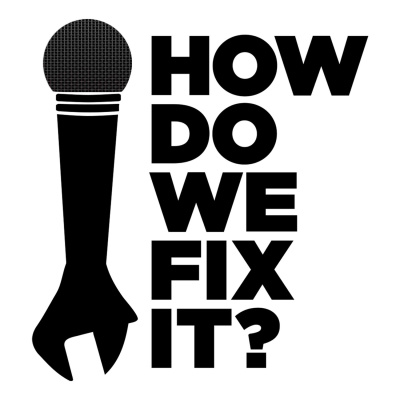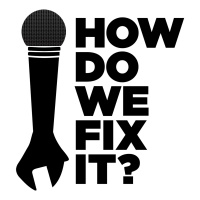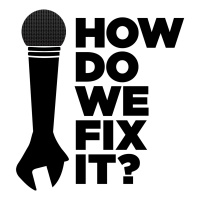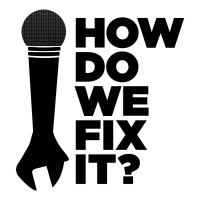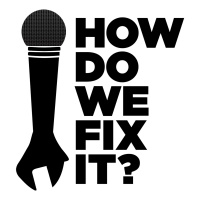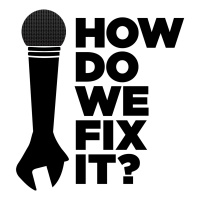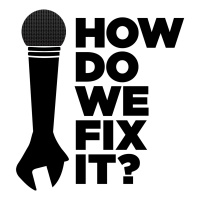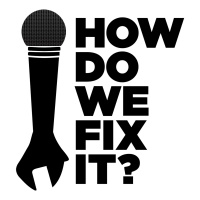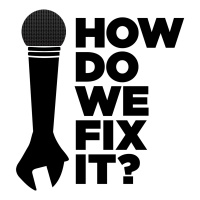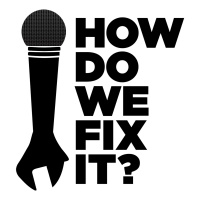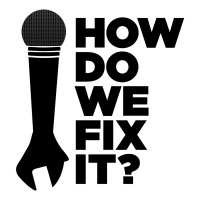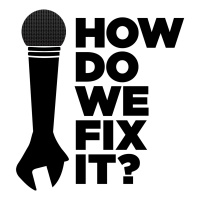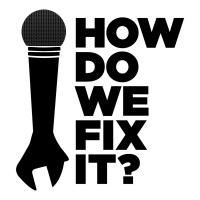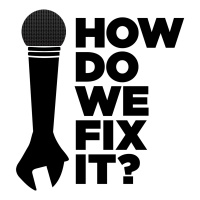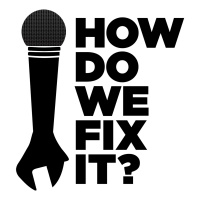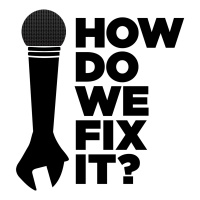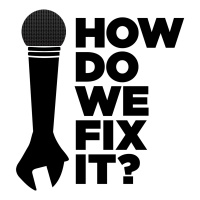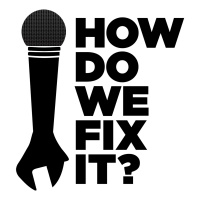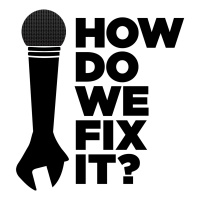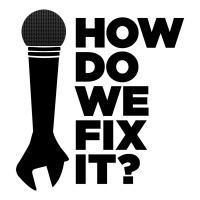Synopsis
From politics to the personal, we're about solutions. Our weekly podcast features two friends and longtime journalists. Join Richard Davies (ABC News) and Jim Meigs (Popular Mechanics) as they challenge authors, experts and provocateurs in a search for positive, practical ideas. Guests include Alan Dershowitz, a noted legal scholar and defender of civil liberties; Mike Rowe of "Dirty Jobs" and Lenore Skenazy, founder of "Free Range Kids." Topics include politics, parenting, personal finance, human behavior and much more. "How Do We Fix It?" - a repair manual for the real world. Produced by DaviesContent
Episodes
-
Want Consensus? Try Convergence: Rob Fersh
16/01/2020 Duration: 23minAll too often news headlines and social media are dominated by disasters, wrongdoing and fear mongering: All the stuff that’s going wrong. How can we nurture the positive side of human nature? Renewing democracy will be impossible unless we start to rebuild trust in each other.The Convergence Center for Policy Resolution uses deep knowledge and proven methodology to connect people, policymakers and political organizations from different backgrounds and beliefs, helping them work together and co-operate. Our guest is Rob Fersh, the non-profit group's Founder and President. "Convergence works to bring together people who can make a difference in big national policy issues," Rob tells us. "Our goal is to include a wide diversity of views, because the product, if we get agreement, is going to be all the stronger."This week's reading, viewing and listening recommendations on the show from Richard and Jim:- Novels by Paulette Jiles - "News of the World" and "The Color of Lightning
-
Iran After Suleimani: 7 Ways to View The Crisis
09/01/2020 Duration: 18minThe U.S. drone strike that killed Iranian general Qassem Suleimani sparked immediate fears of war. The risks of a disastrous miscalculation are obvious, from goading Iran into speeding up its nuclear weapons program, to a forced withdrawal of American forces from Iraq and the re-emergence of ISIS.But the audacious attack against Iran's most experienced military strategist may weaken the regime and force Iranian leaders to curb their aggression. Both may viewed as significant achievements. "Iran appears to be standing down," said President Trump, five days after the killing. In this episode, Jim and Richard discuss seven tools that help us understand the significance of what happened. They include: Watch out for scare tactics by both sides of the debate; Don't take mass protests at face value; Read a broad range of opinions from different sources; Beware of simple answers; Understand the wisdom of "I don't know", and just because Trump acted doesn't mean he was wrong.Neither Richard nor Jim are exper
-
2020: Celebrating Collaborations and Sharing
26/12/2019 Duration: 24minIf independent podcasts are to prosper and survive in this era of growing commercialization, big media, and multi-million dollar podcast investments, we need to grow our community: Share, collaborate and promote groups, individuals and podcasters who share many of our goals.In this first "How Do We Fix It?" episode of 2020, we include recent interviews with leaders and supporters of Bridge Alliance, Civic Hall, Heterodox Academy, Solutions Journalism Network and Listen First Project. We support their efforts to strengthen democracy, boost curiosity, find constructive solutions and emphasize the positive.We've included clips from our 2019 interviews with Debilyn Molineaux, Arthur Brooks, Micah Sifry, Jodie Jackson and Pearce Godwin. As we celebrate collaboration and sharing, we also want to give a shout-out to three more vital groups that we will be working with in 2020: The McCourtney Institute for Democracy at Penn State Universi
-
Two Threats to Democracy: Conspiracies & China
19/12/2019 Duration: 24minLiberal democracy, free speech and freedom of the press are under attack in many parts of the world. Two of the most insidious threats are from conspiracy theories and the growing global reach of China's dictatorship.In this episode we discuss two interviews from "Democracy Works", a podcast series from The McCourtney Institute at Penn State University about what it means to live in a democracy. Larry Diamond, author of the 2019 book, "Ill Winds: Saving Democracy from Russian Rage, Chinese Ambition and American Complacency" discusses the threat China's model of authoritarian capitalism poses to democracy in the United States and around the world. The Chinese government is using its growing military, technological, and economic to change the direction of the world.Conspiracies are becoming increasingly prominent in the public discourse. Democracy Scholars Democracy scholars Russell Muirhead and Nancy Rosenblum call the current version “conspiracy without the theory” and unpa
-
How to Fight Anti-Semitism" Bari Weiss
11/12/2019 Duration: 30minAnti-semitism is on the rise in the U.S. and other parts of the world. Jews are the targets. Democracy and free speech are also among the casualties. 6 people died this week in Jersey City, New Jersey, in a shootout at a kosher supermarket. The two gunmen appear to have been motivated by anti-semitism and anger against the police. Britain's Labour Party has been rocked by widespread reports of anti-semitism. Labor's second most powerful leader has apologized to the Jewish community and admits the controversy may affect the result of this week's U.K. election. Our guest in this episode of "How Do We Fix It?" is Bari Weiss, an opinion writer at The New York Times, who covers culture and politics. We discuss her new book, "How to Fight Anti-Semitism.""When anti-semitism is rising it is the number one sign that a society is dying or maybe is already dead," Bari tells us. "The proximate victims are Jews themselves, but the bigger and overlooked victim, if you look
-
How Technology Could Save the Environment: Ted Nordhaus
06/12/2019 Duration: 23minMany environmentalists believe that the world needs to use less energy, end the focus on economic growth, and return to a simpler lifestyle. The Breakthrough Institute argues the opposite.In this episode, we look at the ecomodernist movement that promotes technological solutions to environmental and human development challenges.Ted Nordhaus is a leading global thinker on energy, environment, climate, human development, and politics. He is the founder and executive director of the Breakthrough Institute and a co-author of An Ecomodernist Manifesto.Reducing carbon emissions "matters and is important not necessarily for human survival, but for a world that I would like to leave for future generations," Ted tells us. "Bio-diversity... tropical rainforests and savannahs: I care about all of those things, and the debate with environmentalists is how you get them."The Breakthrough Institute offers a different kind of framework for thinking about climate change. We discuss solutions in t
-
The Power of Play: Lucy Crehan, Tamara Mose
28/11/2019 Duration: 26minMany of us are spending much of the Thanksgiving holiday with the children we love. In this episode we consider vital role of play, and what it does to expand a child's creativity and resilience.Urban sociologist Tamara Mose is an Associate Professor at Brooklyn College, and author of "The Playdate: Parents, Children and the New Expectations of Play." She tells us about the strengths and perils of playdates, and the need for children to have unstructured play.Educational consultant and teacher, Lucy Crehan, is the author of "Cleverlands", an exploration of the lessons learned from the world's top-performing education systems. Her research also highlights the importance of play in the learning process.In Finland, where math and reading scores are among the highest in the world, "they don't start education formally until seven-years-old," says Lucy. Instead of meeting academic targets in kindergarten or first grade, "they're focusing on a much broader educational and social development before they sta
-
Radical Health. Ivelyse Andino
22/11/2019 Duration: 27minPublished: November 21st, 2019“Tech For The Public Good” is supported by a grant from Solutions Journalism Network.Technology is a double-edged sword. Despite well-publicized threats from bots, hackers, government spooks and huge online firms with their invasive algorithms, tech is often a force for public good.In this special episode, we report on an innovative local effort to promote better healthcare for those who need it most: the residents of America's poorest Congressional District: New York's 15th CD in The Bronx.Ivelyse Andino, founder and CEO of Radical Health, a minority-owned, Bronx-based health equity social enterprise that uses technology, an app powered by artificial intelligence, and community conversations to help black and brown pregnant women and new mothers understand their health care rights, build trust and develop self advocacy. According to US government statistics, black women are up to six times more likely to die from complications of pregnancy than white women. "The U
-
Civility Won't Save America: Reed Galen
15/11/2019 Duration: 25min30 years ago this month the Berlin Wall came down, and Richard was there, reporting the story for ABC News. In those heady days of November, 1989, there was tremendous hope for the future of liberal democracy. In the next few years, most of Eastern Europe would emerge from the shackles of totalitarian communism.But today, populism and nativism are on the rise in much of the world. Democratic institutions, civic norms, and a free press are all facing new challenges.We speak with public affairs and political consultant Reed Galen, and look at whether the case for greater civility is overshadowed by the need to push back hard against the populists, and those who sneer at compromise, tolerance, reason, flexibility and other vital pillars of a functioning democracy."The Democrats are playing chess and Trump's eating the pieces," says Reed, who resigned from the Republican Party in 2016. "He will take your civility and squash you with it."Further thoughts from Reed on civility here.With this epi
-
How We Really Change Our Minds - Eleanor Gordon-Smith
07/11/2019 Duration: 30minWith today's furious political and cultural divisions, it's easy to shake our heads in exasperation at those who disagree with us. In this episode with Australian writer and philosopher, Eleanor Gordon-Smith, we take a journey to the limits of human reason. Her compelling new book, "Stop Being Reasonable. How We Really Change Our Minds," features six high-stakes personal stories of successful persuasion that illustrate what most of us get wrong about rationality. "Hearing the story of how somebody changes their mind is hearing the story of how they change their life," Eleanor tells us. "Why, when we know that changing our minds is as tangled and difficult and messy as we are, do we stay so wedded to the thought that rational debate is the way to go about it?"The book and our podcast begin with Eleanor interviewing men who catcalled her in the street and made obscene gestures. Did she convince these guys to change their behavior? Find out what happened... See acast
-
Understanding Brexit: Jill Rutter
31/10/2019 Duration: 26minConfused by Brexit? This episode looks back over the last 40 months since the shocking result of the Brexit referendum, when UK voters decided to leave the EU. We sort through the mess and misconceptions.The political drama contains several acts: A December election has been called, and a new Brexit deal was reached in late October by Prime Minister Boris Johnson and European Union member states. But well over three years after the referendum, the UK Parliament has yet to agree to the terms of withdrawal. The December 12 vote could bring more confusion, with no party winning an overall majority. One the biggest hurdles is deciding what kind of Brexit voters actually want. For this episode, Richard traveled to London and spoke with Jill Rutter, senior research at the non-partisan think tank, UK in a Changing Europe. She writes frequently about Brexit and the UK's evolving relationship with the EU."The Prime Minister is very keen to be able t
-
Fixing Government and Democracy: David Meyers
25/10/2019 Duration: 25minAmerican democracy is in a moment of crisis. A new Gallup poll, released in late October, says a near-record-high 34% of Americans cite the government, poor leadership or politicians as the most important problem currently facing the U.S.In this episode, we look at the work of a new online news site, The Fulcrum, which is focused exclusively on efforts to reverse the dysfunctions plaguing American democracy. "Our goal is to raise the level of awareness so people can understand what's wrong with the political system, and how they may go about getting involved to help make it better," says David Meyers, publisher and executive editor of The Fulcrum. We look at the controversy over voting rights, access to polling, the role of money in the American political system, gerrymandering, and how a group of volunteer hackers broke into all 100 voting machines they went after. See acast.com/privacy for privacy and opt-out information.
-
Celebrating Nuance: Meghan Daum
18/10/2019 Duration: 27minModern thought has been damaged by dogma and tribalistic click-bait. Social media and the fractured state of politics reward slick slogans and partisan anger while penalizing those who speak with intellectual honesty. Our guest, feminist writer and author, Meghan Daum, says instead of following the crowd we need to think for ourselves. While very supportive of the goals of the women's movement, she is also critical of the excesses of modern feminism. In this episode she makes the case for nuance and feeling conflicted about our own opinions. "I always say to my students, if you're not conflicted you're either lying to yourself or you're not very smart," she says.Meghan is the author of "The Problem With Everything: A Journey Through The New Culture Wars". Her witty and rigorous new book is a personal account of "the conflicted and tortured state of liberalism generally and feminism in particular. But it is also a personal story of feeling existentially unmoored against the backdrop of a co
-
"Listen First & Democracy" Pearce Godwin
10/10/2019 Duration: 21minAmerican democracy is in crisis, with a coarsening of our national conversation and an erosion of public trust that threatens the guardrails of self-government. Many citizens feel dislocated, disempowered and believe that remote institutions and government don't listen to their needs and interests.One way to bridge divides is to listen to a broader range of opinions, from people not like you.Our guest is Pearce Godwin, founder and CEO of Listen First Project, which has 250 partner organizations who have joined the #ListenFirst movement as well as the thousands who have signed the Listen First Pledge.Listen First sounds like a moderate idea, but "I think it really is radical," Pearce tells "How Do We Fix It?" Coming to conversations "with a spirit of curiosity is what will bring us to a place in which we are learning from one another and building greater connections, as opposed to throwing grenades and tearing each other apart."The four key ingredients of a listen first conversati
-
We Need Better Leaders! Davia Temin & Stephen Miles
03/10/2019 Duration: 25minThe furore over the decision by House Democrats to launch a formal impeachment investigation into President Trump will be the subject of heated debate for many months. In this episode we take a deeper look at leadership, and why good leaders are so vital to the future of our democracy, and for all organizations-- large and small. "In times of turmoil this is even more important," says our guest, Davia Temin, a highly experienced crisis manager, and leadership and communications coach. "Leadership is particularly important right now, because we are living in a very muddy universe."In business and non-profit organizations, highly successful leaders have learned vital lessons about strategy, communication and ethics. We hear from Stephen Miles, a widely respected leadership coach and top-level succession planning executive. His deep understanding of what makes great leaders is featured in The Miles Group podcast series, "C-Suite Intelligence: Leadership Lessons F
-
Dementia: Memory and Forgetting: Nicci Gerrard
27/09/2019 Duration: 32minDementia provokes profound moral questions about our society and the meaning of life itself. How much are we connected to one another? In what ways are we distant and separated? What does it mean to have a self? How can we offer dignity to those who suffer from Alzheimer's and other forms of this terrible disease?Worldwide around 50 million people have dementia. The US Centers for Disease Control estimates that the U.S. total is more than five million. The numbers are growing with the aging of the population. The incidence of Alzheimers increased more than 50% in the pst 15 years. People over the age of 85 are the largest growing share of the population.British journalist and author Nicci Gerrard is our guest. Her father's long struggle with dementia led Nicci to investigate what the disease does to those who live with it and to their caregivers. She writes with deep wisdom, kindness and empathy in her new book, "The Last Ocean A Journey Through Memory and Forgetti
-
Immigration Facts -- Not Emotion. Andrew Selee
20/09/2019 Duration: 27minWith harsh rhetoric from President Trump, who wants strict new limits on refugees, asylum seekers and some other forms of immigration, to calls by several Democratic Presidential candidates to decriminalize all border crossings, the immigration debate is increasingly dominated by slogans rather than substance.Hopes for a comprehensive and humane overhaul of U.S. immigration law have all but disappeared for now."The reality is illegal immigration has come to be THE conversation, says our guest, Andrew Selee, President of the non-partisan Migration Policy Institute, which seeks to improve immigration policies through fact-based research. "Most immigration in the United States is legal immigration," he says. "What we're not talking about is that most people are legal immigrants, and that most people are coming Asia, rather than Latin America."Also, he says: "immigrants on average have a higher education level than native-born Americans, which is something few of us realize."In this episode, we unp
-
Kids Aren't Fragile! Lenore Skenazy
12/09/2019 Duration: 25minKids are smart, strong, and at least as capable as their parents were at their age. So, when the crime rate is at a 50-year-low, why does society insist on bubble-wrapping them? Why are we encouraged to protect children from minor cases of physical or mental discomfort? Why don’t we trust them to do things safely or successfully on their own?These questions about raising kids are tackled in this episode of "How Do We Fix It?" We consider practical solutions for parents and schools."Treating kids as physically and emotionally fragile is bad for their future, and ours," says our guest, Lenore Skenazy, founder of Free Range Kids and President of Let Grow, a group that helps schools set-up unstructured free play before and after school hours.A recent study published in the Journal of Abnormal Psychology found that rates of depression among teenagers rose nearly 60% since 2009. The number of young people seen in emergency rooms who had attempted suicide or rep
-
Risk: An Economist Walks Into a Brothel. Allison Schrager
05/09/2019 Duration: 27minFrom dating to switching jobs and managing retirement. We all manage risk. Want to get better at it?The best way to learn is to ask some of the real experts: Magicians, gamblers, big-wave surfers, horse breeders, and prostitutes. That's what economist, journalist and risk advisor Allison Schrager did. She's our guest in this episode.For people faced with risky decisions every day, making the right choices can be the difference between success or failure, and in some cases, life and death. Allison is the author of the new book "An Economist Walks Into a Brothel: And Other Unexpected Places to Learn About Risk." She visited Nevada's Moonlight Bunny Ranch brothel, hung out with paparazzi who stalked celebrities, spoke with movie makers in Hollywood, and went to a risk conference for surfers in Hawaii as part of her extensive research for the book.We learn basic lessons about human psychology as well as hedging, diversification, leverage and insurance. "You take risks to get wha
-
The Threat From China: Elizabeth Economy
29/08/2019 Duration: 27minA trade war with China is a growing threat to U.S. influence and the global economy. What began more than a year ago with President Trump’s decision to impose tariffs has become an unpleasant economic reality for many American businesses. Recently, the U.S. labeled China a “currency manipulator.” But Perhaps, an even larger long-term threat comes China’s aggressive espionage offensive that is playing out in behind-the-scenes as of the U.S. and China struggle for global dominance.Our guest is Elizabeth Economy, a senior fellow and director of Asia studies at the Council on Foreign Relations in New York. Her most recent book, “The Third Revolution: Xi Jinpeng and the New Chinese State”, explains the background to recent dramatic changes inside China.She is among a distinguished group of China specialists who once favored engagement with Beijing, but are now calling for the United States to take a more forceful approach as China attempts to undermine democratic values.&nbs
